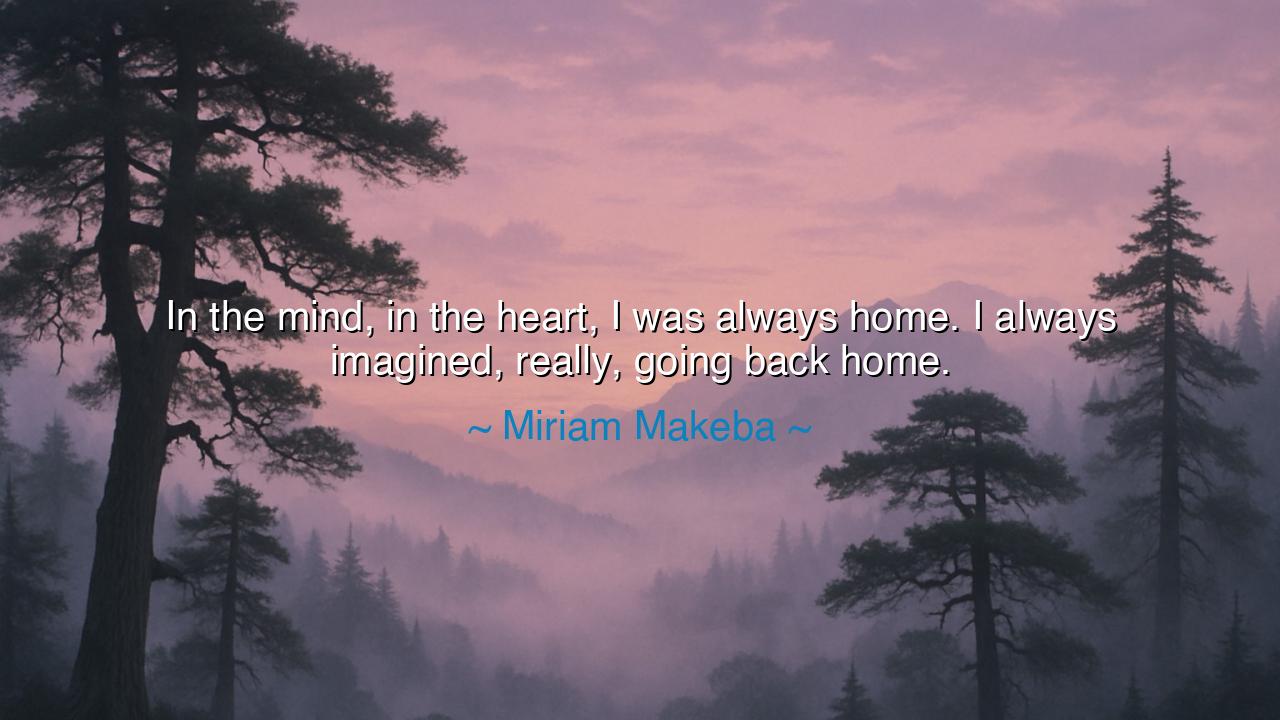
In the mind, in the heart, I was always home. I always imagined
In the mind, in the heart, I was always home. I always imagined, really, going back home.






When Miriam Makeba, the voice of Africa, said, “In the mind, in the heart, I was always home. I always imagined, really, going back home,” she was not speaking only of a place, but of a longing older than any nation — the yearning of the soul to return to its origin, to the soil that first called it to life. Her words rise from the deep well of exile and belonging, from the pain of being torn from one’s roots and the triumph of never letting them die. In her voice echoes the cry of countless hearts across time who have wandered far from the land or love that made them, yet carried it still — not in their hands, but in their hearts.
Born in South Africa, Makeba was exiled for her defiance against the chains of apartheid. She sang for freedom, and for this she was forbidden to return home. Yet in foreign lands, her songs became bridges across oceans, weaving Africa’s heartbeat into the ears of the world. Though her body was far from her homeland, her mind and heart remained rooted in it — as a tree remembers the earth even when a branch is cut away. For her, home was not only the red dust of her village, but the rhythm of her people’s voices, the memory of their struggle, the music of their hope. In every stage she stood upon, she planted her spirit like a seed of Africa itself.
Her words carry the wisdom of the ancients, who taught that home is not merely where one is born, but where one’s spirit recognizes itself. Even when the body is driven into exile — by war, by oppression, by time — the inner self can remain steadfast in belonging. To be “always home in the mind and heart” is to understand that no power can exile love, memory, or faith. The tyrant may seize the land, the ocean may divide the shores, but the heart remains unconquered. Home, then, becomes a spiritual geography — a place that exists wherever one remembers, creates, and loves in the name of what was lost.
Consider the tale of Odysseus, the wanderer of old. For twenty years he roamed the seas, ensnared by storms, sirens, and gods. Yet through every trial, his heart was anchored to Ithaca, his home. Though his ship was wrecked and his men perished, the vision of that small island burned like a flame within him. It was his inner home — the one built in the heart — that guided him through every storm. In the end, it was not the strength of his arms but the steadfastness of his longing that carried him back. In this way, Makeba’s truth is the same as Homer’s: that no journey can truly end in despair if the heart remembers the way home.
Makeba’s vision is both personal and universal. For many, exile is not only of land but of spirit — the feeling of being estranged from one’s true self, from one’s values, or from the love one has lost. Yet even then, the imagination becomes a compass. By envisioning the return — by keeping alive the dream of home — we preserve the thread that connects us to meaning. In this way, to “imagine going back home” is an act of defiance against despair. It is to say: You may scatter me, but you cannot unmake me. My home lives wherever my heart refuses to forget.
The power of this truth is immense. For it reminds us that home is not always something to be found — it is something to be remembered, rebuilt, and carried. The homeless, the exiled, the displaced — all can find strength in knowing that home endures in the heart’s fidelity to what it loves. In remembering who we are and where we come from, we reclaim our identity against every force that seeks to erase it. Makeba’s words teach that to be at home in oneself is to be unbroken — to walk the earth with belonging even in foreign soil.
So learn from her, child of the world: carry home within you. Let your memories be your map and your love be your dwelling. Do not measure home by walls or borders, but by the truth you refuse to forget. Wherever you go, build peace, sing your song, and keep your roots alive in your heart. For those who are at home in mind and heart can never truly be lost; they move through the world as living sanctuaries of all they have loved. And when at last they return — whether to the land of their birth or to the final resting place of the spirit — they shall find that they had been home all along.






AAdministratorAdministrator
Welcome, honored guests. Please leave a comment, we will respond soon